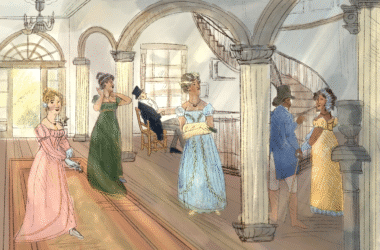Seeing The Vagina Monologues can be a bit intimidating – but it’s precisely that hesitation that the show is trying to counteract. The Monologues was created as an attempt to reclaim female sexuality by making “vagina” – both the word and the body part – less taboo. Writer Eve Ensler wanted people to see Monologues and say to themselves, “I didn’t know we could talk about this. I guess we can.”
This year, director Jessica Kostuck selected eight actresses from the 75 girls who auditioned to perform the monologues. With each new monologue, we witness the actresses transition into different roles. Each story sounds genuine, as if the actresses had experienced them personally, and each brings something unique to the table.
The monologues cover a range of topics that are positive, negative, and just plain funny. The most memorable monologue is one in which a woman tries to convince the audience that the word “cunt” shouldn’t be a term that people are ashamed to use. She exemplifies this point by turning the monologue into an interactive stomping-and-clapping-filled sing-a-long of “We Will Rock You,” in which the words of the chorus are replaced with repeated cheers of “cunt!” Another standout monologue is the one told by a dominatrix sex worker (played by Emily Murphy) who strives to pleasure women. Her monologue ends with a bang as she imitates all the women she has slept with, giving a firsthand report of their different moans. When asked after the show where she practiced her plethora of moans, Murphy’s answer was short and sweet: “My floor-mates put up with a lot.”
While the Monologues was initially created to simply “celebrate the vagina,” it has since changed to a movement to stop violence and injustice against women. The Monologues served as an inspiration to found V-Day, a global movement to end violence against women. However, this seems to detract from the original motive of the Monologues. The play is helpful in spreading awareness surrounding violence towards women, but I think the Monologues would be more enjoyable if they stuck to stories which, as advertised, “celebrate the vagina.” Instead, the play sometimes comes across as preachy – condemning men and heterosexual relationships through the negative portrayal of male roles greatly outnumbering the positive ones in the script. This makes the play less appealing to men, limiting the audience that the play’s original message of female sexual empowerment can reach. Nonetheless, the monologues concerning sexual violence and abuse are still very powerful. The final monologue is told from the point of view of a girl who was abducted and forced to work as a sex slave for over two years, eventually escaping with her new child. This monologue ends the play with the effective line meant to be imprinted in every woman’s brain: “No one can take anything from you if you don’t give it to them.”
The advertisements for The Vagina Monologues guarantee that no one will ever look at a woman’s body, or think of sex, in quite the same way again. In my opinion, the Monologues didn’t resonate quite as strongly as the tagline suggests. It was definitely engaging, funny at times, and included a nice variety of stories that showed off the actresses’ talent. However, I would not go so far as to say it completely changed my perspective on sexuality. That being said, it was very entertaining and it is something that both women and men should experience seeing.
The Vagina Monologues run Friday February 5 to Sunday February 7 in Leacock 132. Shows start at 8 p.m. and tickets are $12 for students.








